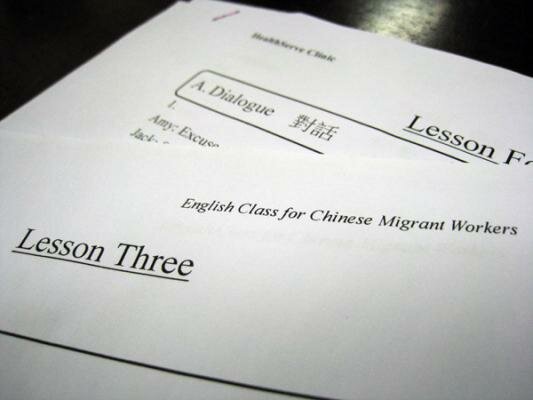spik gʊd ɪŋglɪʃ
No longer lost in translation. Chinese migrant workers in Singapore try to get a better grasp of what's going on around them by learning some ɪŋglɪʃ.
Don't worry if you couldn't read the title. I wouldn't have been able too either. It reads "Speak Good English". The irony? Most native speakers wouldn't have been able to read that.
I've recently begun to attend free English lessons conducted by an non-profit organisation called Health Serve. Established to provide free and cheap medical service to transient workers in Singapore, Health Serve began to include workshops such as these to give its service a more holistic approach.
When I entered the class on the first day and read the phonetics on the white board, I thought to myself, this is hard enough for me, what more for someone who hardly has a grasp on English.
English can also be tricky. The word "match" for example, could mean anything from a stick that lights a fire, a game of football, or something that goes along with something else. "Second" would be the place after first, or a unit of time. And we haven't even gotten to past, present and active tenses yet. I might've been more overwhelmed than the students.
The five Chinese migrant workers from An hui, Shandong, and Hebei provinces took notes fastidiously. Alongside the new English words, they wrote in fluent Chinese script, the myraid of definitions that a single English word can have and the ways in which it may be used.
After the first hour, it was time for them to practice speaking the words they just learned. The teacher, a volunteer from Taiwan who's on holiday in Singapore, encouraged them to put the words into sentences and think of ways they might be able to use the words.
The class went quiet. Heads turned to look down at their books. Pens held firmly in their hands.
So the teacher begins asking questions and calling names.
When called to speak, the students aged between the late 20s and late 30s, staggered softly and with doubt, but they got it all right. I was blown away. Putting myself into their shoes, I didn't think I would have understood anything clearly enough to have learned anything.

The English classes began sometime in 2008 and were initiated by a Singaporen volunteer. The pilot sessions saw students that were shy and unmotivated. They were also unable to commit time to attend the classes regularly. Most of the workers, work between 10 and 12 hours a day, 6 days a week. It can be hard to convince them to give up their only off day for an English class.
Because of the poor student reponse, volunteers faded away. Several volunteers were from local tertiary institutions who had applied to volunteer at Health Serve to score points for their Community Involvement Program (CIP) subject, as for course work in their syllabus, so they came and they went. The students couldn't build relationships with their teachers and the teachers couldn't get used to their students.
Then, a Chinese student at a local university learned about the English program through a friend of his, and decided that instead of playing computer games and languishing in social media networks through the weekend, Sundays can be better spent, trying to enrich the lives of Singapore's transient workers.
Another volunteer from Taiwan, who is traipsing around Southeast Asia on a backpack while based in Singapore, decided to commit his Sundays for an entire year to the English program.
The duo, fluently bilingual and committed, set the structure for a systematic English language course for the students. In turn, the structure gave students a direction, and the commitment from the volunteer teachers gave them motivation.
"What is your name?" One of the workers ask me.
I give him an answer and return his question.
"My name is Si Bin."
"How old are you Si Bin?"
"I am 26 years old."
Si Bin, signed a contract to work in Singapore and was told that he'd be a mechanic. He worked about three years to earn the money he needed to convey himself onto this Island Republic. When his plane from Hebei berthed at the state-of-the-art Changi Airport, he was enthisiastic. He got onto the back of a truck and was shuttled to a terrace house in Geylang. He entered the dark and narrow corridor, and was shown his room.
His room is about the size of my bedroom. Except that he shares it with 5 other people, a microwave oven, a fridge, a rice cooker, and a stove. He works as a janitor at a biotechnology outfit. I'd be disappointed too. If learning English can help him integrate if even a little, and benefit something from his time in Singapore, he figures it's a worthy way to spend two hours on his only off day.



 Debby Ng forayed into journalism following failed attempts at becoming a world-class equestrian. A wildlife crime investigator, underwater photographer, dive master and founder of a marine conservation organisation, she spends what remains of her time writing about the environment, its wildlife, and its people.
Debby Ng forayed into journalism following failed attempts at becoming a world-class equestrian. A wildlife crime investigator, underwater photographer, dive master and founder of a marine conservation organisation, she spends what remains of her time writing about the environment, its wildlife, and its people.













